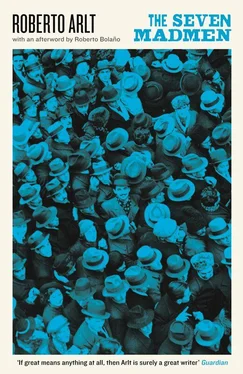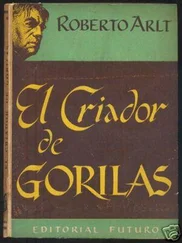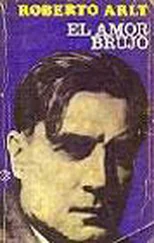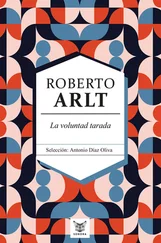Erdosain could find no explanation for the hatred Barsut inspired in him. He imagined him to be a coarse, vulgar man, but this did not tally with certain dreams Gregorio had, which revealed a strange, ill-defined but delicate nature governed by the most inexplicable feelings.
Sometimes though, his apparent or real vulgarity became openly repugnant, and Erdosain had to bite back his indignation with a twist of his pallid lips, while Barsut poured out indescribable obscenities for the sole pleasure of wounding the other man’s sensibility.
Theirs was an invisible, underhand duel, fought without any immediate aim, but so unnerving that whenever Barsut left, Erdosain swore he would not receive him the next day. Yet a few hours before nightfall, Erdosain found himself already thinking of him.
Often Barsut arrived and started talking even before he had sat down: “Know something? I had the strangest dream last night.”
Unsmiling, his gaze fixed on the south-east corner of the room, an almost doleful expression on his face grimy with a three days’ beard, Barsut launched into a tedious monologue that revealed the terrors a twenty-seven-year-old may have: for example how he had been scared by a one-eyed fish winking at him in the dream, then how he had linked the one-eyed fish to the snooping gaze of an ancient madam hooked on spiritualism who was trying to get him to marry her daughter, and then spinning out his conversation in so many absurd directions that soon Erdosain forgot his loathing and instead wondered if the other man were not stark, staring mad. While Erdosain listened, paralysed and deeply disturbed, Elsa sat sewing in the next room, oblivious to it all.
Erdosain could feel a quiver of impatience setting his knuckles knocking, and the effort he made to conceal this spasm exhausted him. It was only with the utmost difficulty that he could get out any words at all, as if his lips were stuck together with glue.
Propping himself up at the table on one elbow, and straightening the crease in his trousers with the other hand, Barsut sometimes complained that nobody loved him. He stared straight at Erdosain as he said this. At other times, he scoffed at his own fears — and at a ghost he said he saw in the corner of the lavatory of his rooming-house, the ghost of a giant woman with bony arms, who carried a broom, and stared at him like a harpy. On other evenings he admitted that if he was not already a sick man he would end up being so. Feigning concern for his state of health, Erdosain would enquire about the symptoms and recommend he rest and stay in bed; once, when he insisted, Barsut maliciously retorted: “Does my being here bother you that much?”
Other nights Barsut was sinisterly cheerful when he came in, like some sour drunk who has set fire to a petrol station. He would reel around the dining-room, slapping Erdosain on the back so often it set his teeth on edge, and asking him over and over: “How’s it going? How are you?”
Barsut’s eyes would flash, while Erdosain stood there forlorn and hunched, wondering what it was that so inhibited him in the other man’s presence, like now as he sat perched on the edge of his chair, still relentlessly spying out the corner of the room.
They always avoided each other’s eyes.
There was an ill-defined, obscure link between them, of the kind that two men who heartily loathe each other endure for reasons they cannot fathom.
Erdosain hated Barsut, but with an insipid, cowardly rancour made up of wicked fantasies and even more terrible possibilities. And his hatred was all the more intense for not having any specific focus.
Sometimes he found himself imagining a ghastly revenge, and he frowned deeply as he conjured up the worst catastrophes. But the following day when Barsut knocked at the street door, Erdosain would tremble like an adulterous woman caught out by her husband, and he once even flew into a rage at Elsa because she was slow in opening it, commenting in a way aimed at disguising his cowardice: “He’ll think we don’t want to invite him in. If that’s the case, we should tell him not to come any more.”
Lacking any real motive, this subterranean loathing spread in Erdosain like a cancer. Barsut’s every gesture gave him an excuse to feel outraged, to wish him a horrible death. And as if sensing these feelings, Barsut seemed unconsciously to respond in the most revolting way. Erdosain never forgot the following instance:
It was one evening when they had gone out for a cocktail. With their drinks, the waiter brought a plate of potato salad and mustard. Barsut stuck the toothpick so greedily into a piece of potato that he spilt the salad all over the marble table-top, filthy from cigarette ash and other people’s dirty hands. Erdosain watched in disgust as Barsut mockingly scooped up the salad piece by piece, and then when he reached the last one, smeared it in the mustard spilt on the marble, and popped it in his mouth with an ironic smile.
“Why don’t you lick the table-top?” Erdosain observed with distaste. Barsut threw him a wild, provocative glance. Then he bent over and licked the whole marble top spotless.
“Satisfied?”
Erdosain had turned white.
“Have you gone crazy?”
“What’s the matter? Don’t tell me you’re upset.”
Then all at once Barsut burst out laughing and was all smiles again, suddenly released from the fury that had gripped him all evening. Soon he got up and continued talking his usual nonsense.
Erdosain never forgot that sight: the bronze bristles of Barsut’s head bent over the marble top, a tongue stuck in the viscous grime of the yellow stone.
He often thought that Barsut must hate him because of all he had confided in him. And yet he could not contain himself — no sooner did he arrive at Erdosain’s house than he began to pour out his unhappiness by the bucketful into his host’s ear, even though he knew this only made Erdosain rejoice all the more.
The fact was that Remo drew out these confessions, encouraging them with a fleeting but real compassion which made Barsut’s hatred of him dissolve whenever he offered serious advice. But the loathing came rushing back whenever he caught one of Erdosain’s rapid, furtive glances which showed his pity had given way to an evil glee at the proof of Barsut’s miserable existence because although he had enough money to get by without working, Barsut was terrified at the thought he might go insane as his father and brothers had done before him.
Suddenly, Erdosain straightened up. The negro with the wing collar had stopped picking at himself; the three pimps were sharing out bundles of money while the cab drivers at the other table shot them avid looks out of the corner of their eyes. The negro was staring so pathetically at the pimps it seemed as though the magic of the money was about to make him sneeze.
Erdosain stood up and paid. Then he left, saying to himself: “If Gregorio fails, I’ll ask the Astrologer for the money.”
If anyone had forewarned Erdosain that a few hours later he would be plotting to kill Barsut and that he would be watching passively as his wife left him, he would never have believed it.
He wandered around the whole afternoon. He needed to be on his own, to forget human voices and to feel as cut off from all that surrounded him as someone who has missed his train in a strange city.
He walked along the lonely arcades of Arenales and Talcahuano, the corners of Charcas and Rodríguez Peña, the crossroads at Montevideo and Quintana, enjoying this magnificent architectural spectacle for ever denied to the poor and wretched. Leaves from the plane trees crunched under his feet as he stared up at the rounded panes of the huge windows, silvered by the gleaming white of their lace curtains. This was a world far from the brutish city he knew, another world he could feel his heart yearning for with a slow, heavy, beat.
Читать дальше











